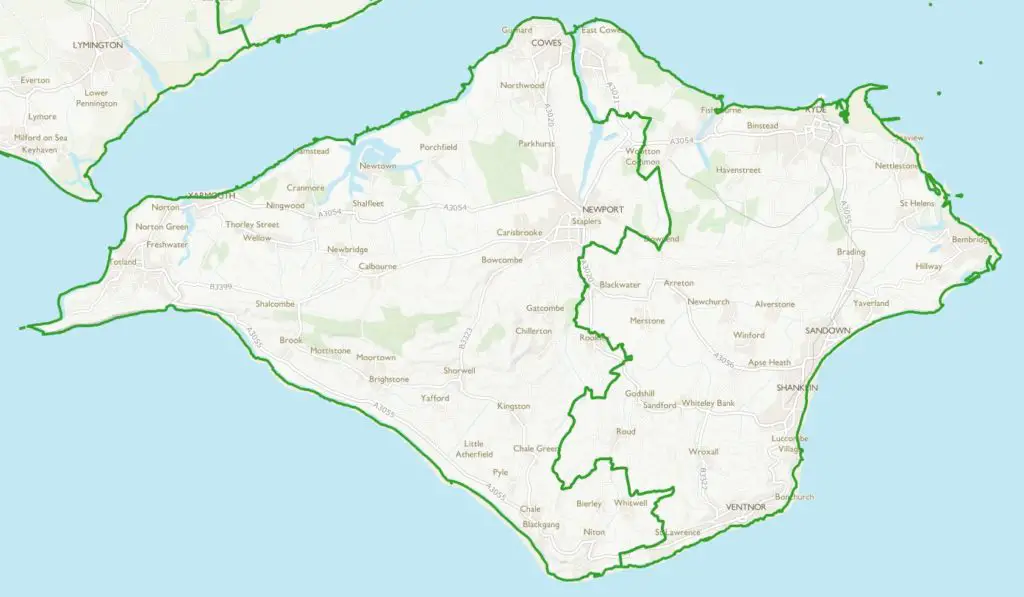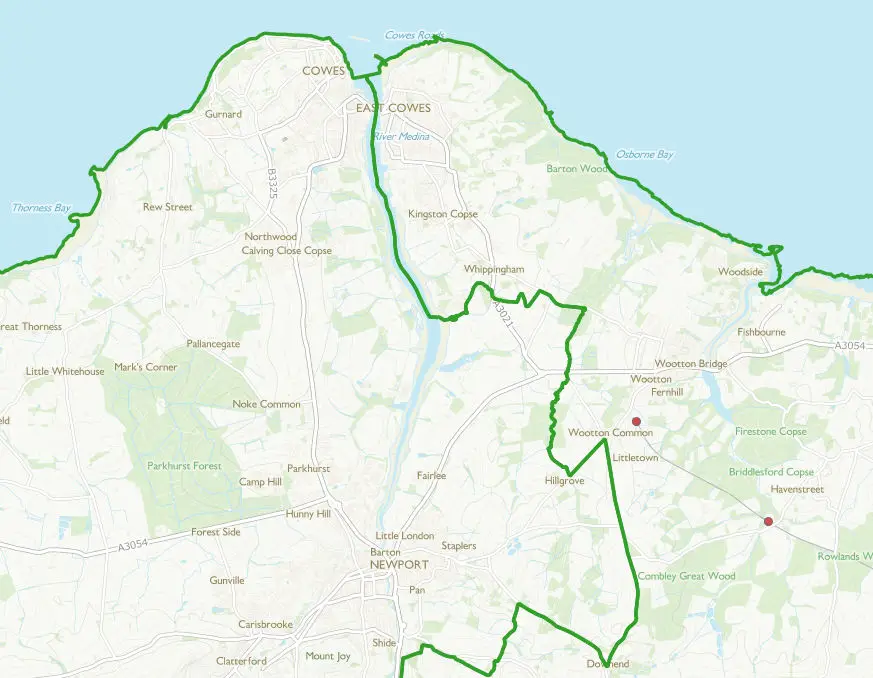The Boundary Commission for England has today (Monday) published its final recommendations for new parliamentary constituency boundaries (not to be confused with local council boundaries).
The Commission’s final boundary review report was submitted to Government last week, and that report now being presented to Parliament.
Boundary changed again
As reported previously, the Isle of Wight constituency is proposed to the separated into two constituencies.
The latest plans appear to have changed since last October. Whippingham and East Cowes are no longer in the West constituency.
Isle of Wight recommendations
In the Final recommendations issued today the two Isle of Wight Constituencies break down as follows:
Isle of Wight East CC (Final recommendation Sept ’18)
| Ward | Electorate |
|---|---|
| Arreton and Newchurch | 3,007 |
| Binstead and Fishbourne | 2,627 |
| Brading, St. Helens and Bembridge | 5,930 |
| East Cowes | 2,944 |
| Godshill and Wroxall | 2,517 |
| Havenstreet, Ashey and Haylands | 2,685 |
| Lake North | 2,785 |
| Lake South | 2,881 |
| Nettlestone and Seaview | 2,427 |
| Ryde East | 2,763 |
| Ryde North East | 2,546 |
| Ryde North West | 2,573 |
| Ryde South | 2,841 |
| Ryde West | 2,614 |
| Sandown North | 2,294 |
| Sandown South | 2,807 |
| Shanklin Central | 2,660 |
| Shanklin South | 2,721 |
| Ventnor East | 2,265 |
| Ventnor West | 2,325 |
| Whippingham and Osborne | 3,072 |
| Wootton Bridge | 2,705 |
| Total | 61,989 |
Isle of Wight West CC (Final recommendation Sept ’18)
| Ward | Electorate |
|---|---|
| Carisbrooke | 2,548 |
| Central Wight | 2,758 |
| Chale, Niton and Whitwell | 2,271 |
| Cowes Medina | 2,874 |
| Cowes North | 2,393 |
| Cowes South and Northwood | 2,867 |
| Cowes West and Gurnard | 2,973 |
| Freshwater North | 2,148 |
| Freshwater South | 2,421 |
| Newport Central | 2,840 |
| Newport East | 2,669 |
| Newport North | 2,384 |
| Newport South | 2,580 |
| Newport West | 2,460 |
| Parkhurst | 2,292 |
| Totland | 2,287 |
| West Wight | 2,694 |
| Total | 43,459 |
The relevant section from the recommendations report is copied below for your convenience (the document is over 200 pages).
Initial proposals
727. The Isle of Wight sub-region is unique in England in that we are required to allocate two constituencies, and that neither are required to be within the permitted electorate range.Our initial proposals were for Isle of Wight East and Isle of Wight West constituencies, each with a similar number of electors, 53,268 and 52,180 respectively. Consultation on the initial proposals
Consultation on the initial proposals
728. During consultation on our initial proposals, most of the opposition to our proposals for the Isle of Wight was about the principle of splitting the island. This is a statutory requirement under the legislation, so these views had to be set aside. The east–west split of the island received both support and opposition, with a small number of responses suggesting a north–south split.729. We received some representations that commented on the boundary between our Isle of Wight East and Isle of Wight West constituencies. A representation suggested that the Wootton Bridge electoral division looked more towards Ryde than towards Newport and Cowes, and another suggested the Wootton Bridge electoral division has close ties with the Fishbourne electoral division, and therefore should be included in the Isle of Wight East constituency.
Revised proposals
730. In formulating our revised proposals, we were persuaded by the evidence to modify the
constituencies by including the Wootton Bridge electoral division in the Isle of Wight East
constituency rather than Isle of Wight West.Consultation on the revised proposals
731. We again received a mixture of support for and opposition to our revised proposals during the final consultation. Some representations indicated a desire locally that the East Cowes electoral division be included in Isle of Wight East, as its ties are with Ryde to the east. Respondents indicated that the River Medina was a divider in this area, which separates East Cowes from West Cowes. Our investigations of this proposal indicated that this modification would also require the Whippingham and Osborne electoral division to be included in the Isle of Wight East constituency due to the road links in the area. We noted that this pattern of constituencies would bring the electorate of the two island constituencies further away from the parity we sought at the initial proposal stage, 43,459 for Isle of Wight West and 61,989 for Isle of Wight East.Final recommendations
732. Having considered the evidence, we have decided that the East Cowes, and Whippingham and Osborne electoral divisions should be included in the Isle of Wight East constituency. We consider that this change better reflects the evidence we received about community ties.733. Our final recommendations for the Isle of Wight are for constituencies of: Isle of Wight East, and Isle of Wight West. These constituencies are listed in Volume two and shown on the maps in Volume three of this report
End of the ‘consultative process’
The Commission has now fulfilled its statutory responsibility, and submission of the report and its publication ends the Commission’s involvement in the 2018 Boundary Review.
Secretary to the Commission, Sam Hartley, said,
“The recommendations we’ve published today mark the end of a thorough and consultative process to build the new map of constituencies. We’ve travelled the country, taken account of over 35,000 public comments, and heard many impassioned views about how best to reflect local communities in our recommendations, while ensuring that constituencies are all much more equally represented.
“We’re confident that the map we propose today is the best match of the legal rules Parliament has set us. It’s now up to Parliament to decide whether these boundaries will be used at the next general election.”
The Government must now make arrangements for the Commission’s recommendations to be voted on by both Houses of Parliament. It is for the Government to decide when to do so.
The final recommendations can be viewed on the Commission’s Website.
Image: allthosedetails under CC BY 2.0







